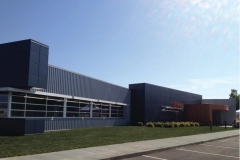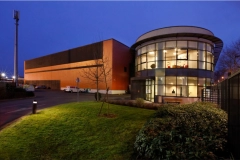Microsoft Using Mixed Reality for Remote Audits of Azure Data Centers
Microsoft Using Mixed Reality for Remote Audits of Azure Data Centers
Microsoft has begun using its HoloLens mixed reality technology to provide remote auditors a detailed look inside Microsoft Azure data centers, enabling compliance audits to continue during the pandemic and dramatically reducing travel for member of its cloud team.
The Microsoft initiative is one of the more creative examples of adapting to limits on physical access to data centers. The program is still in its early stages, but Microsoft said it has “has received very positive feedback” from auditors at several different vendors.
The Microsoft Cloud Operations & Innovation team introduced Microsoft Dynamics 365 Remote Assist on HoloLens 2 devices so that auditors can conduct remote audits without needing to be onsite. It’s a high-tech expansion of video techniques many data center service providers have employed to provide customer tours of data centers during lockdowns.
A Microsoft employee wearing a HoloLens can serve as the “remote eyes” for the auditor, who can see what the wearer is seeing, in real time. An onsite staff member can demonstrate a procedure instead while an auditor watches remotely, and can ask to inspect different facets of infrastructure.
Mixed reality (sometimes known as augmented reality) combines real and virtual components, integrating digital imagery into a user’s field of vision. The headset has the ability to superimpose charts, text, guides, and images over the wearer’s view. The HoloLens 2 device also includes speakers and a microphone, making it easy for the wearer to communicate with others. Mixed reality is slightly different than virtual reality (VR) which allows users to interact with created digital environments and objects,
Microsoft says its use of mixed reality tools shortened the time required for audits, while reducing travel-related carbon emissions. The initiative has also meant “a priceless restoration of work-life balance” for employees on the Azure compliance team, according to a Microsoft case study.

A staffer at Microsoft’s West Des Moines data center campus with a HoloLens 2 equipped with headphones and microphone. (Image: Microsoft)
“This combination has been a game changer for us, for our auditors, and for the staff supporting us in the datacenters,” said Lee Moscal, Senior Program Manager for Microsoft.
Close Collaboration With Auditing Teams
Azure cloud supports more than 90 compliance requirements on its platform, including Payment Card Industry (PCI) data standards for financial services companies or HIPAA privacy guidelines for healthcare providers. Compliance audits have previously been time-intensive processes requiring significant travel to span global data operations. Microsoft says it had already been testing a remote solution, but the need became more urgent with the onset of the global COVID-19 pandemic, which shut down most international travel and sharply limited access to data centers.
The Remote Assist team and Azure staff worked closely with auditors to develop its solution. That included through security testing to certify the HoloLens as a Zero Trust device that could be brought into data center environments.
“We realized that this approach wouldn’t work for us unless we got buy-in from our auditors – it’s their professional reputation on the line when they conduct an audit,” said Moscal. “So, we partnered with them to figure out the best way to use it in a remote auditing situation.”
Microsoft said the HoloLens system has brought significant reduction in audit times. The complete audit typically took six to eight weeks, but using Remote Assist it takes just two to four weeks, as much more can be done in real time, rather than requiring advance planning.
Smart Glasses Enable International Remote Installs

A data center technician in China wearing smart glasses installs Open Compute hardware while being coached by remote team members. (Image: Softfoundry)
Microsoft isn’t alone in using remote video headsets to conduct remote data center tasks. In March 2020, during the early days of the pandemic lockdown, a team of engineers in France guided a data center technician in Xinzhou, China using Softfoundry’s FacePro Smart Glasses through the installation of an Open Compute rack in a RapidSpace data center.
The only onsite staff had no experience assembling or installing servers, but brought all the servers and equipment into the data center and wore the smart glasses to join a virtual meeting with engineers from IT firm Nexedi, who were watching from France, Poland and other areas of China.
Using the glasses, the field staffer had their hands free to assemble machines while reading instruction displayed on the glasses and listening to direct advice from the Nexedi team. The staffer assembled cabinet rails and a bus bar, and populated a cabinet full or Tioga Pass servers and a switch, and set up remote access so software could be installed and managed by the remote team. The procedure was described in detail on the Softfoundry blog.
More >> Microsoft Using Mixed Reality for Remote Audits of Azure Data Centers


